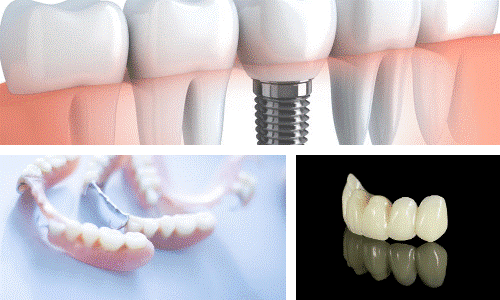Dental Concerns: Dentures Before and After
Getting dentures can be a life changing event. This article dives deep into dental concerns regarding dentures before and after they are placed.
Written by Kierra Brown, RD & reviewed/edited by Katie Dodd, MS, RDN, CSG, LD, FAND
Kierra is a Dietitian & is pursuing her M.S. in Nutrition Sciences at Indiana University Pennsylvania.
Before Dentures
Practicing good oral hygiene, regular visits to the dentist, and following a healthy diet impact oral health. A healthy mouth is important for all ages; however, aging can introduce various dental concerns.
Proper Dental Care
Daily brushing with fluoride toothpaste, flossing, and rinsing with mouthwash are components of good dental care. Regular dental check-ups and cleanings are also an important part of maintaining proper dental care; unfortunately, Medicare does not cover routine dental care. Dental schools, dental hygiene schools and community health centers may provide low-cost dental care for older adults.1
Dental Concerns for Older Adults
 Dental concerns for older adults include tooth decay, gum disease, tooth loss, dry mouth, oral cancer, and chronic disease.2 Chronic conditions such a diabetes, osteoporosis, and Alzheimer’s disease as well as medications can affect oral health.
Dental concerns for older adults include tooth decay, gum disease, tooth loss, dry mouth, oral cancer, and chronic disease.2 Chronic conditions such a diabetes, osteoporosis, and Alzheimer’s disease as well as medications can affect oral health.
Dental concerns impact nutrition if chewing or swallowing difficulties develop.
The Impact of Oral Health on Nutrition
Oral hygiene practices can impact nutrition. Proper nutrition, minimizing intake of added sugars, processed starches and low pH-level acids lowers the risk of cavities and tooth loss.3
Older adults may experience tooth loss, reduced saliva, decreased appetite which can affect nutritional status.3 The mouth is the entry point to an individual’s digestive and respiratory tracts and certain bacterium can cause disease. Learn more about the risks of poor oral hygiene.
Foods to Consume and Foods to Avoid
Water, dairy, lean proteins, fruits and vegetables and nuts are good for oral health. Lean proteins contain phosphorus which helps strengthen teeth. Dairy also contains phosphorus and calcium which help build healthy teeth. Chewing ice, citrus foods, sugary beverages, alcohol, and sticky foods make the teeth more susceptible to decay.4
Preparing for Dentures, What You Should Know
Dentures may be necessary for a variety of reasons. The process for getting dentures may be lengthy and may not be the most suitable option for everyone, so it is important to consider all alternatives.
When are Dentures Necessary?
 Consider dentures when multiple teeth are missing, intake is poor, oral health is diminished, or an individual is experiencing depression around an impaired ability to eat. Older adults with chewing difficulties may benefit from dentures to improve oral intake. Improved oral intake can also increase independence.
Consider dentures when multiple teeth are missing, intake is poor, oral health is diminished, or an individual is experiencing depression around an impaired ability to eat. Older adults with chewing difficulties may benefit from dentures to improve oral intake. Improved oral intake can also increase independence.
Lastly, they could also improve self-esteem if seniors are concerned about their facial appearance.
Preparing for Dentures
Preparing requires multiple appointments with a dentist. A dentist may extract some teeth and provide temporary dentures. It can take weeks to months between initial appointment and receiving dentures. Individuals should expect an adjustment period after receiving their dentures. Finally, dentures are intended to last 5-7 years, but many keep them for much longer!
How Dentures Look and Feel
Dentures resemble natural teeth and the change in appearance may be very small. They can improve an older adult’s confidence in smiling, eating, and feeling more like their old self (before tooth loss). It will take time before the mouth adjusts to the new dentures. Minor irritation and soreness is normal.5 Adjustments can be made to the dentures if they look odd or feel uncomfortable.
Alternatives to Dentures
Bridges and implants are alternatives for dentures. A bridge is attached to surrounding teeth and covers the space where one or more teeth are missing. With dental implants, an artificial tooth is anchored to the jawbone, mimicking the roots of an actual tooth. Dental implants are best for a few missing teeth. However they can be quite costly.

Things to Consider Before Dentures
Dentures are not an equivalent to teeth, but a good alternative for those without any other choice. Consider available options, cost and maintenance required for dentures.
Types of Dentures
Dentures are intended to be replacements for missing teeth. Dentures are either partial or complete. Partial dentures are used when one or more natural teeth remain. The partial denture attaches to the remaining natural teeth. Complete dentures are used when all teeth or most teeth are missing. It may take 6 to 12 weeks after tooth removal to be ready for dentures, this time allows the gum tissue to heal.
Implant supported dentures are another option available, but this can be more expensive and the process for getting these dentures takes even longer than traditional dentures.
Cost and Insurance
Some dental insurance providers cover some or all cost of dentures, but call your provider to find out specifics.5 Medicare only covers dental services related to specific medical conditions or treatments. It does not cover routine dental care or dentures. Medicaid is a state-run program that may provide limited dental services for adults. Also consider the cost of denture maintenance and denture adhesive as needed.
Denture Maintenance
Like natural teeth, bacteria can stick to full or partial dentures. Brush and rinse dentures daily. Brush dentures with a toothbrush, no toothpaste and soak in cleaners made specifically for dentures!3 To keep the lining of your mouth healthy, take your dentures out for at least 4 hours every 24 hours.3 Like teeth, dentures require daily care to stay safe and healthy.

After Dentures
Dentures can affect speech, eating and nutrition but these concerns typically resolve as the user gets adjusted to wearing them.
Difficulty Speaking
Individuals may have difficulty pronouncing certain words. Practice the words out loud and with time individuals will be accustomed to speaking properly with dentures.5 Contact the dentist if dentures “click” when talking; they may require an adjustment. Difficulty speaking will resolve as individuals get comfortable wearing them. A speech therapist can also help with improving speech after getting dentures.
Eating with New Dentures
Dentures are replacements for natural teeth and getting used to them is a major adjustment. They can impact taste and temperature of foods and older adults may continue to have chewing problems. Start with soft foods cut into small pieces or pureed foods. Add more variety as the person adjusts to the new dentures.5
Adjust the temperature of foods and beverages, as necessary. Using adhesive can enhance stability, bite force and sense of security.5
Nutritional Concerns
Chewing difficulties may persist with dentures, a modified diet such as a pureed diet may be recommended to improve intake. Eating with dentures takes time; therefore, encouragement in wearing dentures is important. Furthermore, seniors with ill-fitting dentures or those who eat without their dentures may experience unintended weight loss. In addition to the pureed diet, consider high calorie smoothies and high calorie shakes to maintain adequate intake.
Dentures Before and After Conclusion
There are many things to consider related to dentures before and after. Although different routines, proper oral care is essential for the maintenance of both natural teeth and dentures.
There are concerns with both natural teeth and dentures. Consider the cost, types of dentures available, denture maintenance and denture alternatives before committing to dentures. Furthermore, dentures and their associated alternatives are not replacements for teeth but alternatives that can correct dental concerns and minimize nutritional concerns.
Learn more about dentures and good dental health at our other articles on Oral Health:
If you are looking for some additional education or client education handouts, check out my Oral Health in Seniors SERIES handouts on RD2RD.
References
- National Institute of Dental and Craniofacial Research. Finding Low-Cost Dental Care: Information for Caregivers. https://www.nidcr.nih.gov/sites/default/files/2020-07/finding-low-cost-dental-care-EN.pdf. Published August 2020. Accessed August 9, 2020.
- Centers for Disease Control. Oral Health for Older Americans. https://www.cdc.gov/oralhealth/basics/adult-oral-health/adult_older.htm. Reviewed May 22, 2019. Accessed August 7, 2020.
- American Dental Association. Healthy Habits. https://www.mouthhealthy.org/en/adults-over-60/healthy-habits. Accessed August 9, 2020.
- American Dental Association. Top 9 Foods That Damage Your Teeth. https://www.mouthhealthy.org/en/nutrition/food-tips/9-Foods-That-Damage-Your-Teeth. Accessed August 9, 2020.
- Dental Health and Dentures. https://www.webmd.com/oral-health/dental-health-dentures#1. Accessed August 7, 2020.
